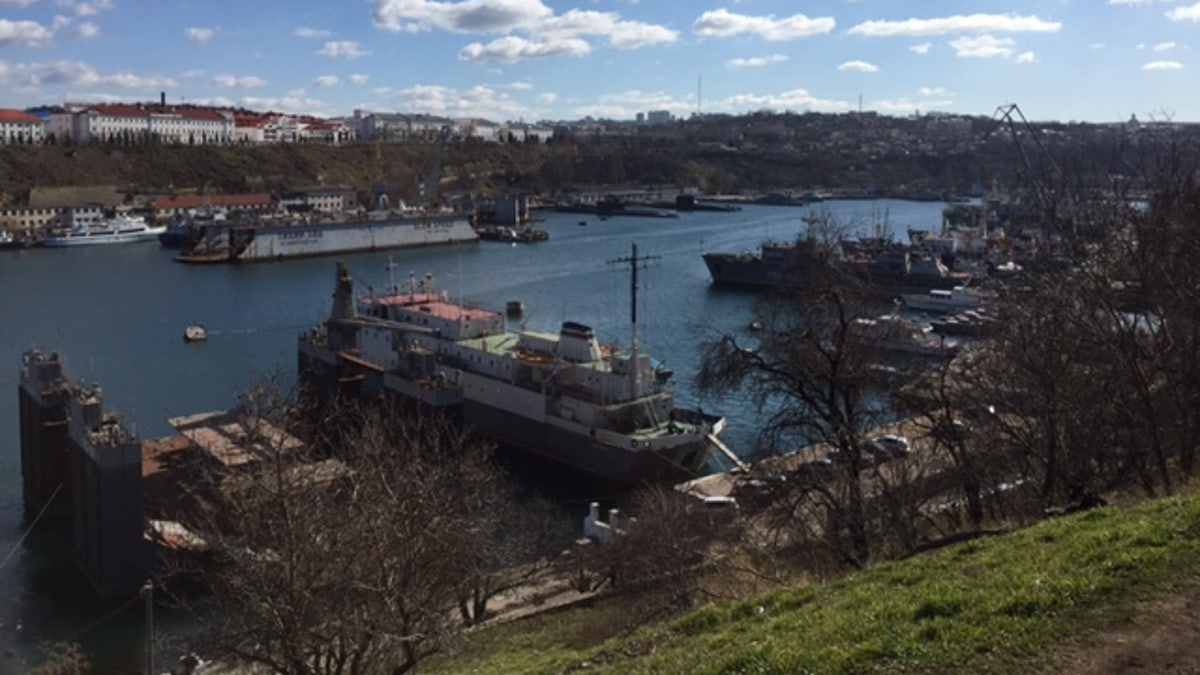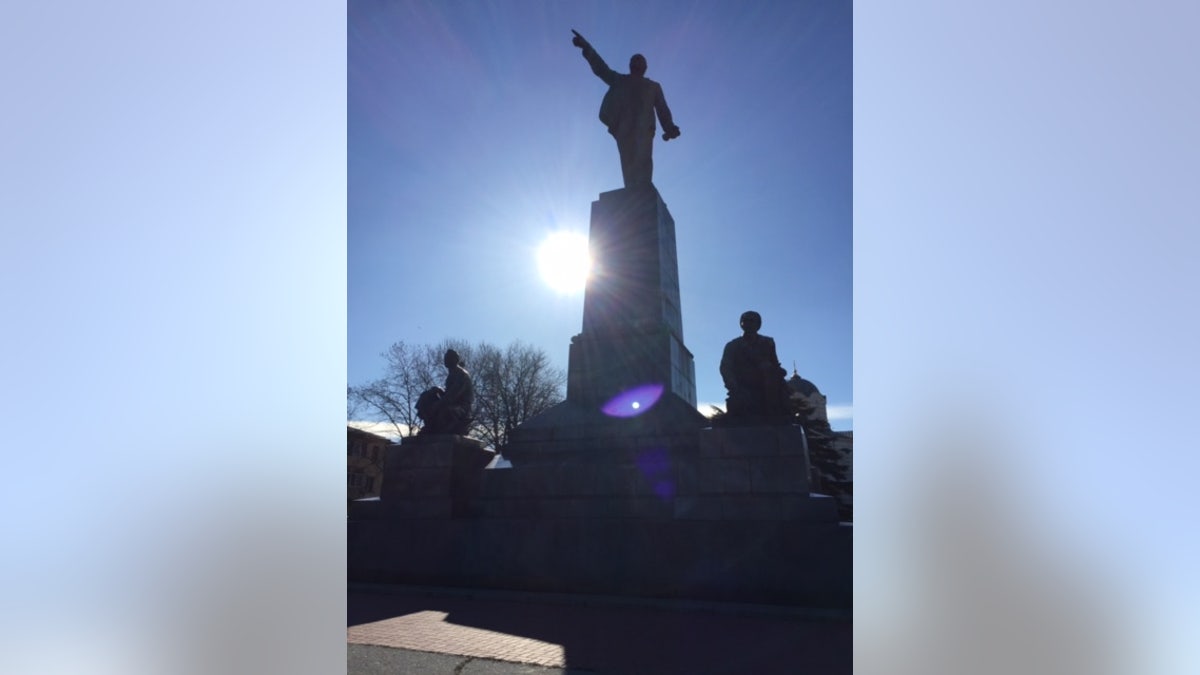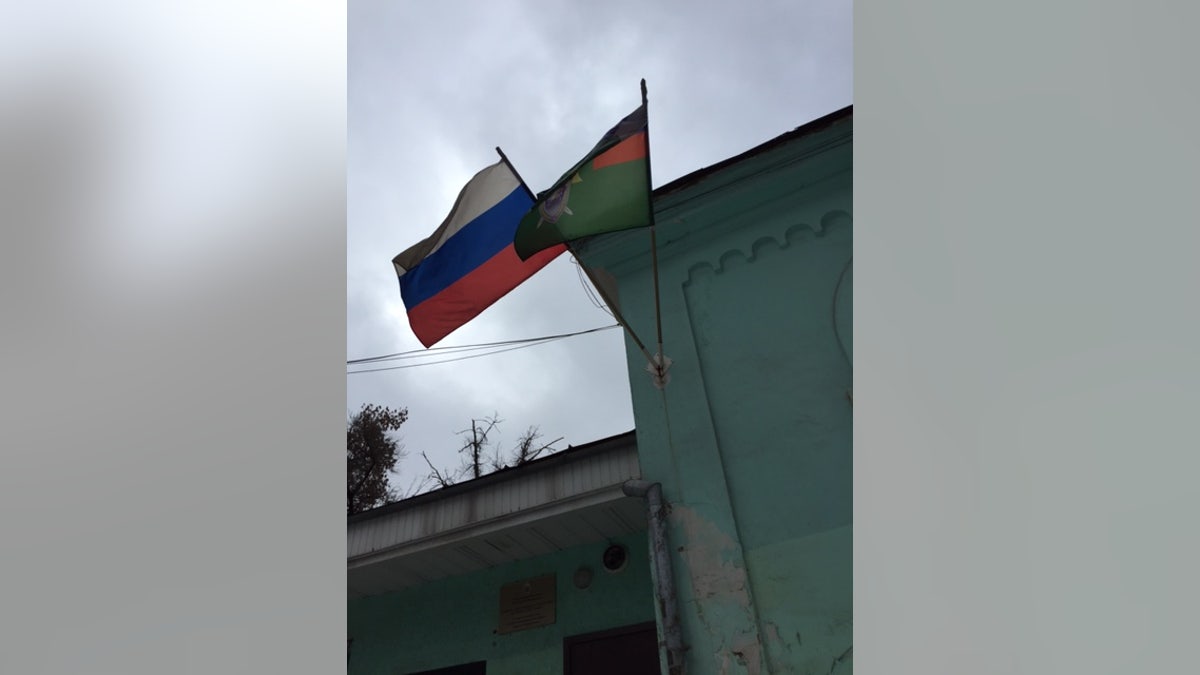SIMFEROPOL, Crimea – It has been almost three years since Russia annexed the Ukrainian-governed Crimea, to the outrage of many leaders across the world. But for many who remain in the Black Sea peninsula, the thought of being returned to the Ukraine is both unthinkable and frightening.
"We are neither Russian nor Ukrainian. We are Crimean. America, the EU, everyone needs to leave Crimea alone!" Olga Borodina, 32, owner of a PR analytics firm, told Fox News from the Crimean capital of Simferopol this week. "Maybe the best scenario is to revisit this referendum in 20 years without all the emotion. Changing back now is impossible. It would be madness."
The issue remains one of the hottest points of contention amid softening relations between the United States and Russia. President Donald Trump has stated that he expects Russia to return the "taken" land, while Moscow has defiantly vowed that it is not even an option for discussion.

Black Sea Fleet off the coast of Crimea. (Hollie McKay)
The snow-dusted Simferopol is a city with an old Soviet-style charm, winding streets, antiquated infrastructure and soldiers sauntering through the streets alongside business people, college students and gypsies. Russian flags flutter from atop buildings and the streets are peppered with graffiti-scrawled murals that say "Russia is our beloved country."
Indeed, Moscow has repeatedly insisted that the vast majority of Crimeans voted to join Russia in a 2014 referendum shortly after the troop takeover, which is described by locals as "unknown little green men" trickling in to occupy the area. However, Kiev has stood firm that the referendum was a sham conducted under coercion.
The annexation prompted then-U.S. President Barack Obama and the European Union to impose more economic sanctions on Russia. Since Trump's election, the Kremlin has sought to have these sanctions lifted – and it was that very topic of private discussion that led to the firing this week of National Security Agency director Gen. Michael Flynn. Many locals say they are the ones bearing the burden of the sanctions, which they claim are hurting them economically.

Vladimir Lenin statue in Crimea. (Hollie McKay)
Borodina, however, is one of many within a growing Crimean movement who declare themselves "pro-sanctions."
"It is good for jobs and good for the people. It makes us do things locally as we can't import, there is a willingness to help each other," she said.
Denis Matrosov, 33, an IT professional and president of Crimea's IT Cluster Association, said the group was formed after the Russian takeover as a positive way for locals to work together and help businesses thrive.
"The sanctions help us to think differently. In the long-term, it is great. Only in the short-term it is chaos but we are past that now," Matrosov explained. "Before 2014, we relied on outsourcing IT contracts and now we have to be more creative. We would like to think we will not go back to before. It is not an option for us."
And that means a complete freeze out from their former, or disputed, government. Following the Crimea accession, Kiev retailed against Russia by largely isolating the peninsula. Those with a registered Crimean address – irrespective of whether they have left the region or not – are deemed non-residents by Kiev, thus cannot open bank accounts, obtain identification or conduct business.
But for many locals, this hostility has only drummed up stronger support for President Vladimir Putin and Moscow leadership, giving them little choice but to settle into the Russian way of life.

After the annexation, Simferopol-born and raised painter Svetlana Gavrikenko, now 26, was one of the most vocal pro-Ukrainian activists, deeply upset over watching what happened to her beloved city. In the weeks leading up to the occupation, there was a calculated and misleading Russia-led media campaign suggesting that "buses of Ukrainians" were coming to kill everyone who remained. People were actually relieved to see Russian-backed troops enter, much to her horror.
But almost three years on, Gavrikenko has changed her thinking.
"I was determined for two years I did not want a Russian passport, I did not want to be Russian. But when I went to Kiev to renew my documents I was treated so badly, I was humiliated and felt uncomfortable in my own country," she said. "Meanwhile, Russia – a country I had never even visited before – was doing everything to make us comfortable. A better medical system, the ability to do things online and not wait in lines."
Gavrikenko acknowledged that while it is a "bad sign" anytime a country seizes land, going back now "feels awful."
"Can you imagine how we will be treated by Kiev? Like traitors, but worse," she said.
While the land grab continues to dominate media and policy-driven headlines, overall, Crimeans themselves appear to have come to accept their situation.
"It is just not possible to go back anymore, it is like divorcing your wife," said Anton, 30, a CG engineer in the once closed USSR Crimean city of Sevastopol, home to Russia's Black Sea Fleet and a quaint assortment of burgeoning seaside resorts. "America shouldn't interfere in this drunk bar fight. Things will work out by themselves."

Pro-Russia graffiti in Simferopol. (Hollie McKay)
Pro-Putin paintings are placed across the famous city, where only a few vestiges of the past – like the old "Ukraine Hotel" – have yet to be renamed.
RUSSIA ACCUSES UKRAINE OF ARRESTING 2 SERVICEMEN FROM CRIMEA
But many Crimeans say that those who are pro-Ukrainian have been forced out or silenced by the new Russian rule. Pro-Kiev supporters who spoke to Fox News did so under the request that they remain anonymous because they feared retaliation.
"It is getting worse here, there are no prospects. Russia promised us lots of improvements in infrastructure but it hasn't happened," Simone, 30, a former lawyer who moved into the marketing industry after 2014 said in hushed tones from a Simferopol basement cafe. "About 30 percent of Crimeans really want to go back, the rest have just become conformists. They don't want to go through the hard process of changing again."
Simone stressed that Kiev had every right to shun Crimeans and, despite the complacent local attitude, he said it is vital for world leaders like Trump to stay firm.
"We don't want to be forgotten here," Simone added. "If the world can help the Ukraine to develop itself, people here will see that there is a good place to go back to and it will make sense. A place with free speech, a place that beats corruption. People just need to know that it is real."

